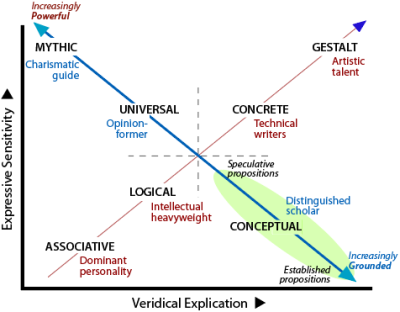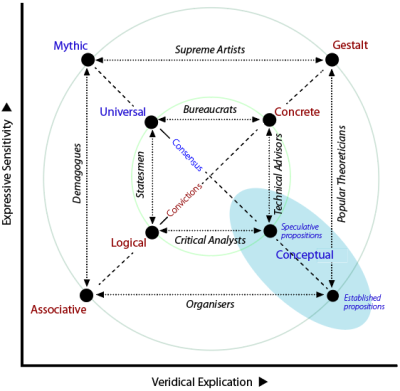Social Leadership
The continuing existence of is a fundamental manifestation of .
As might be expected, leadership of such a group depends on the mastery of language. Leadership capabilities tie in directly to diagonal characteristics: that is to say, leading is based in the ability to weld a consensus.
The capacity to develop genuine convictions is important and beneficial, but secondary. However, as explained below, it does affect social roles.
Consensus Diagonal
As we move up the consensus diagonal, language becomes increasingly emotional and involving, dealing as it does with human wishes and fears. As we move down the consensus diagonal, language becomes increasingly dispassionate and grounded in reality (insofar as that can be understood).

: Language mastery here is a function of study and scholarship. The leader role is held by a distinguished scholar, whom others respect and defer to in disagreements.
: Language mastery here depends on an understanding of how people generally think and feel. It demands being in touch with their values and interests. The leader here becomes an opinion-former, because group members willingly read or listen and find their own opinions becoming formed or modified.
: Mastery here derives from a wish to inspire and an intense self-belief of being chosen as an intermediary between higher transcendental forces and the everyday world. The leader role is held by a charismatic guide, whom others follow seemingly blindly or despite themselves, and whose words they treasure.
Conviction Diagonal
Conviction is more personal than social. So in moving up and down the conviction diagonal, ability relates to what issue is being addressed and how complicated and difficult it is to explain or specify.
Associative Method: The leader of a group of intimates is a dominant personality, but this is not primarily based on language use. It may be based on a rank difference (e.g. at work or family tradition) or result from some innate desire to dominate and control.
Logical Method: Those who focus on logical language appear as intellectual heavyweights or perhaps as philosophers.
Concrete Method: Users of this method become technical writers, who have put in the effort, over many days, weeks or months, to master some object or process.
Gestalt Method: To excel here requires artistic talent.
Societal Roles

Demagogues are charismatic individuals who draw on language while using language to rally and dominate crowds.
Statesmen are leaders who intelligently articulate certain cultural essences and basic principles () so as to influence popular opinion ().
Technical advisers solve specific practical problems () by speculating ().
Popular theoreticians are able to tell a complicated story using established propositions e.g. historians.
Supreme artists are capable of drawing on language while sensitively articulating complex human issues ().
Bureaucrats regulate by specifying detailed procedures () to deliver on popular values ().
Critical analysts articular certain essential principles () to promote speculative ideas () e.g. policy analysts.
Organisers manage their local group () in terms of a particular agreed framework ().
Original posted: 4-Sep-2016. Last updated: 10 Feb-2023.